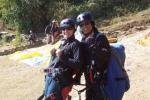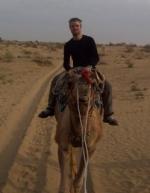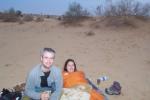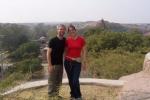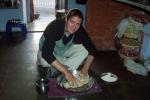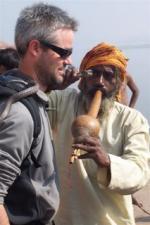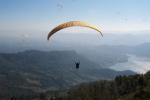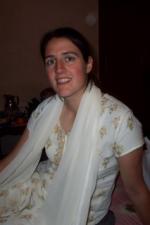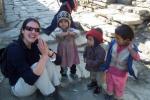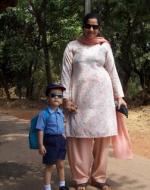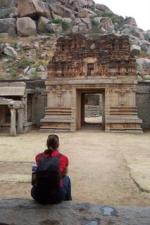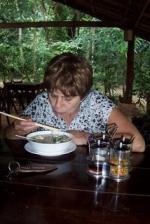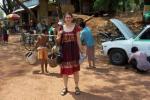The Shower
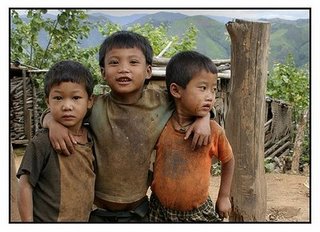
The roads were lined with friendly tea pickers plucking leaves from the myriad of tea plants covering the hills around us. There was no shortage of people to ask for directions. Unfortunately, the accuracy and consistency of the answers we got left much to be desired. Talk to anyone who has been to the orient: never ask directions from a local. It's hard enough getting them to read a proper map, but trying to get your average tea-plucker to make sense of whatever nonsense was scribbled on our fading Valentine card was a thoroughly frustrating endeavour generally culminating in a lot of confused head scratching and a vague wave in a random direction. It wasn't long before we found ourselves way off the dirt roads, tripping over the steep dry scrub growing between tea-plantations: not exactly where one wants to be in a country boasting the world's highest rate of poisonous snake fatalities.
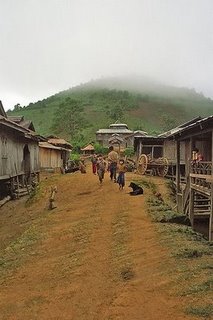
Covered in sweat and dust, we miraculously stumbled out into a clearing and found our way to a wild-west town full of old ramshackle wooden buildings. The town turned out to be "Kunh he" and, encouragingly, had several signs vaguely resembling the text written in the second box of our map. Too tired for basic formalities, I simply shoved the grimy Valentine card into the hands of the nearest resident and pointed to the text which we believe read "take me to your leader". We were soon brought to a beautiful old monastery and introduced to a young monk calling himself "Ken".
"Would you like to wash ?" Ken managed in his best English. There was nothing in the world I wanted more than a good shower. Ken asked me to follow him.
After twenty minutes of walking down a steep hill in my underwear and towel wondering what the residents of Kung He were thinking in selecting this location for their public toilet facilities, we emerged into a clearing full of half naked villagers sitting around a large cement bunker with three wooden pegs sticking out of it. It seemed somehow natural that the whole village had turned up to watch me shower.
"Would you like to wash ?" Ken asked again.
"Yes, please." I replied
There was a long silence while I stared at Ken and the grinning villagers, trying to examine them for some hint as to where I might find the shower facilities. I turned towards the cement bunker.
"Is the shower in there somewhere ?"
Ken motioned me towards the cement bunker, so I walked over to it not quite knowing what to do. I turned around and faced the villagers who weren't even trying to stifle their snickering. "Sorry, I just don't know how this thing works."
"Would you like to wash ?" Ken repeated. Ken had an irritating way of repeating unhelpful things.
"Look, Ken," I began while adjusting the towel around my waist, "do you even know what 'wash' means ? I mean, is this thing even a shower ? Are we even in the right place here ?"
"You wash !" Ken encouraged me.
Hoping for the best, I pulled at one of the wooden pegs. Suddenly, the peg popped out and the entire contents of the cement bunker gushed out at me in a freezing cold torrent of water that threw me off balance. The next thing I remember is lying on the ground in my underwear while Ken and the entire village joined each other in uproariously laughter.
The rest of my bathroom shenanigans, which consisted of the seemingly innocuous acts of brushing my teeth with a toothbrush and washing myself with soap, elicited nothing but more giggles from the villagers every time I peered behind me. Perhaps to save what little dignity I had left, Ken finally came over to show me how it was done. He cautiously pried open the second peg, picked up a smooth round rock, and fiercely scrubbed himself red. He was particular attentive to the top of his head, on which he used the stone to polish each of his tiny gray Buddhist sprouts. After that, he produced a ghastly metal implement which, to my amazement, he shoved deep inside his mouth and thrusted painfully about.
It suddenly became clear to me that out here, I was the one that didn't know what 'wash' meant.
The Evening Cinema
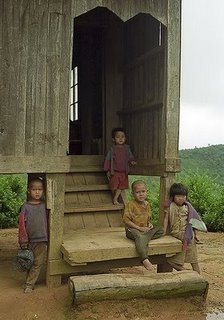
I learned from Ken on our hike back to the monastery that Palaung tribal villages have only one shower for the entire community and about two regular showering times each day, hence my supportive crowd. Back at the temple, we discovered that there is also a single television for the entire village. This television is generally occupied by a gang of couch potato monks who spend the best part of the day glued to the screen watching Thai kick-boxing.
Ken was a slavishly devoted host, but alas, no great chef. He prepared our Chinese instant noodle packs for dinner. It was a bit of a let-down from our lunch experience, but the upshot was we wouldn't have to suffer through another bowl tea salad. As we ate dinner, we watched as most of the villagers quietly filed one by one into the temple's TV room for the evening's entertainment. Ken asked us to follow them inside where an odd assortment of Buddhist relics, incense sticks, and prayer beads were arranged haphazardly around an old television set, a dusty DVD player, and a satellite dish. Ken handed us a binder containing the monastery's DVD collection and urged us to select a movie for the whole village to watch. Everyone smiled at us eagerly as Katlijn opened to the selection on the first page,
"Jaws","Freddy Versus Jason"," Alien"...
We looked up at the quaint tribal villagers and saffron-robed monks smiling expectantly at us. None of these titles seemed appropriate so we turned the page and kept looking.
"Halloween", "Evil Dead II", "Alien versus Predator"...
"Keep looking," began Katlijn nervously eying the countless children climbing around us, "I don't think we can show them this. It's a monastery, after all." We turned the page,
"Rosemary's baby", "The Exorcist", "The Omen"...
Everyone kept waiting for a decision. Some of the kids were getting impatient and began tugging on my arm hair.
"Night of the living dead", "Hostel", "The Texas Chainsaw Massacre"...
Our awkward situation grew dire.
"Wicker Man","Hell Raiser","Jack the Ripper"...
"Just what kind of monks are you !?" I cried out in exasperation, flipping frantically through Ken's macabre collection. Finally, there it was on the last page: the DVD cover for "Narnia". By some miracle, C.S. Lewis had come to our rescue. Katlijn jumped up enthusiastically and announced our selection.
Ken ran off to find the DVD and hit the play button. "It's a good one for children," began Katlijn hopefully to a room full of tribal people who nodded eagerly back to her in non-comprehension.
While the villagers and their children watched the movie with all the seriousness and intensity of discerning film critics, I thought I heard a few groans emanating from the general vicinity of the monks' section when the Disney logo came up. A couple of monks left the room after only a few minutes, and I think I caught one rolling his eyes at us. I guess you just can't please everyone.
The generator cut out halfway through the film and the villagers filed back home. Ken showed us to the meditation hall where he had set us up on the floor with some cosy mats, candles, and blankets. Since I was sleeping in the room anyway, I asked if I could join their morning meditation.
"Not so many monks here meditate in the early morning," he explained. Somehow, I wasn't surprised.
Katlijn and I prepared our beds while a group of monks tip-toed mischievously back out to the television room with an old car battery. I blew out the candle. As I closed me eyes and fell into sleep after a long day, I could hear the soundtrack of James Bond drifting in from the room next door.
The Tea Pickers
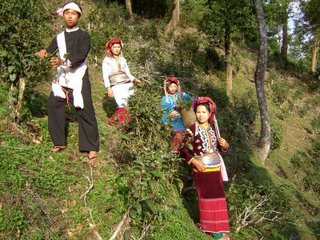
To Ken's credit, he actually did get up to meditate the next morning, though I had the sneaking suspicion that this was for my benefit only. With characteristic devotion, he prepared us our noodles for breakfast and took it upon himself to guide us to the next box on our map. Ken was very eager to connect with us, but after several hours of repetitive conversation, we were forced to come to the conclusion that he really hadn't the foggiest clue what we were saying. Though we liked Ken a lot, and I am certain he would have dutifully followed us all the way back to civilization, we finally had to ask him to leave so we could continue peacefully on our own.
The next line on our map turned out to be a steep up-hill ascent winding through the hills of scattered tribal villages. Groups of tea pickers lined the roads smiling, waving, and occasionally inviting us up to come join them in their work. After a long hike, we arrived at a village called "Kon Haut" and collapsed in front of an old wooden table at a long forgotten tea house. Within moments, a young teenage boy came running out to us.
The young boy introduced himself as "Anderson" and spoke excellent English. Anderson's soft voice and gentle mannerism instantly qualified him as our favorite Burmese person. He insisted on being our guide to his small village and offered us room and board at his wooden house on stilts. As with all the tribal people we met in this part of Myanmar, he and his family adamantly refused any monetary compensation.
Anderson's tiny self-contained village was a gorgeous collection of ancient wooden houses perched on top of a high hill offering a spectacular vista of the surrounding forests and tea plantations. Like all the other villages in the area, every resident grew and picked tea for a living. The Palaung people have been doing this for many centuries, forever as far as the people here knew. Anderson's family owns five small plantations located in disparate parts of the forest. During picking season, they get up at four each morning, hike several hours to their plantation, pick tea until the late afternoon, and walk back before dinner time. All this plucking resulted in some truly spectacular finger callouses, which Anderson and his friends enthusiastically showed us with immense satisfaction. A day's picking will yield about two large sacks of green tea leaves worth a couple of US dollars. This is enough money for Anderson's family to live comfortably out here.
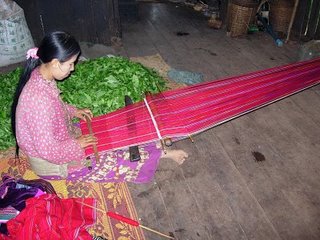
Palaung woman sitting on her floor weaving a dress beside a pile of freshly picked tea leaves.
Anderson introduced us to his friends at the village monastery- a gorgeous two-century-old wooden structure filled with colorful Palaung tribal decorations. Buddhist monasteries, it turns out, serve as the local teenage hangout where young layabouts partake in some serious loafing with the novice monks. We felt very hip chilling with the cool tribal kids, though the boys insisted Katlijn sit on the floor below the men as part of the local Buddhist tradition. The monastery had only three senior monks, three novice monks, and two nuns living next door. The nuns do all the cleaning, cooking, and maintenance for the monastery. It remains unclear to us what monks actually do.
By the late afternoon, we felt we were starting to get the hang of Palaung village life. After hiking out to the cement bunker, I managed to clean myself with only minimal ridicule. Katlijn might have fared pretty well herself, had she not wore her longyi upside-down. Anderson's family meal of rice, potatoes, and dried chili-prawns was beginning to taste downright homey, and (I dare say) I believe I even started developing a vague appreciation for that insufferable tea salad. Sipping daintily on freshly picked tea, we idly watched the villagers file out to the monastery while chatting casually with our hosts over what lurid film they might be showing at the cinema tonight. Somehow, this forgotten Palaung backwater was starting to feel like home.
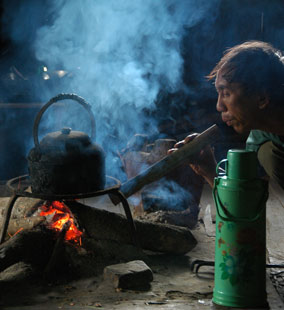
At night, we lay together under the stars with Anderson and he explained to us that he didn't want to pick tea leaves his whole life. He had always wanted to be an English-speaking guide and meet with people from the West.
We retired back inside Anderson's house where he prepared our beds on the floor, just beside the rest of his family who also slept on the floor together with us. In the corner of the room were all of Anderson's possessions: a tiny wooden desk which he barely fit into and a small shelf of old worn-out English language texts that he had collected over the years. As Katlijn and I drifted off to sleep, I watched Anderson's gentle silhouette flickering in the dying candle-light, hunched over his little desk quietly studying a crumbling English book.
Back to Civilization
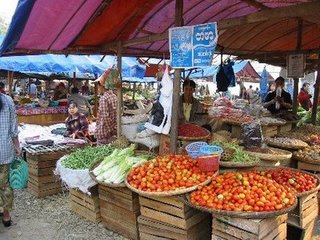 Hsipaw market. Hsipaw market.
Early the next morning, we awoke to the sublimely soothing chanting of Anderson's mother lighting a candle in the family's Buddhist shrine. One of Anderson's friends picked us up, a tough-looking but exceptionally sweet teenager calling himself "Jackson". Katlijn and I piled on the back of his bike and waved goodbye to our good friend Anderson before roaring off motor-cross style to the next box on our card.
Jackson showed us a short-cut through the hills and told us we'd be back to civilization in only five hours at a good walking pace. Of course, we knew better by now and weren't in the least bit surprised when, ten hours later, we finally limped our way past Mister Charles' Hotel, waved a tired "hello" to the cravenly Mister Books, and felt an exhausted euphoria when we heard a familiar voice yell out to us in the distance, "Tell your friends ! I've got the best beans in Hsipaw!" After a long journey off the beaten path, we were back home with the rest of the backpackers.
Given the utility of whatever was scribbled on the back of our tatty piece of Asian Kitsch, it was clear that only Burmese hospitality saw us through our challenge. As we lay down in the comforts of a real bed and rested our aching muscles, I felt an unconscious smile slowly form while I thought about how, on a future day, long after our world travels have ended, when the stress of modern civilization feels too heavy and the accelerated time of the new globalized planet too dizzying, we'll be able to think back to our memories of the motley people of the Palaung tribes, and be comforted by the fact that there is still a timeless place like this left in the world.
Note: Sadly, the photos we took of the area around Namsan in the Shan state of Myanmar were stored on an unreliable media (CD-Rom) inside an even more unreliable plastic casing (made-in-Vietnam) and we can no longer access them. Furthermore, we were unable to find on the internet any images of the villages or areas in the Shan state we trekked through on this trip. However, we were able to find some photographs taken of palaung tribal people in other parts of Myanmar. We selected a few of these based on how well they represented the things and people we saw on our trip. If you see your photo posted here, we thank you very much and you may leave a comment with us below. We do have a backup of all our photographs stored in the safe-haven of Geert's gay-chique apartment in Bangkok. We will update this entry again with our original pictures of the people and places of this story, as soon as we are able to retrieve our backup in a couple of months. In the mean time, we finally caught up with the rest of the twenty-first century backpackers and bought a portable hard-drive.
|



